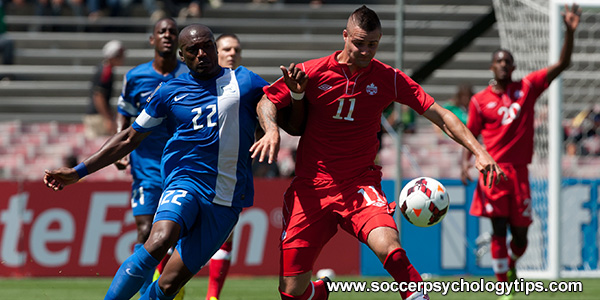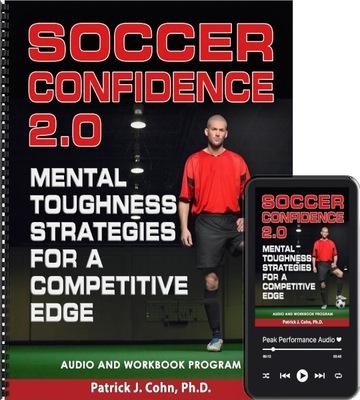
Strategies for Overcoming Sports Anxieties
Do you become “nervous” before you compete? Does anxiety hold you back from playing your best game?
Anxiety or worry is a common concern for many soccer players. Not only does anxiety affect the level of your play, it takes the fun out of playing.
Anxiety was the problem area of an athlete who responded to our Soccer Survey:
“Why do I always get so anxious before a game that I feel sick or lightheaded? How can I overcome this?”
Anxiety, more specifically performance anxiety, is based in fear or apprehension about what’s to come or what might or might not happen. The effects of performance anxiety have profound physical and mental consequences before and during soccer games.
Think of test anxiety, for example…
You studied for hours the night before, but you are not sure if you studied the right material. You wonder, “What if the topics I studied are not on the test? What if I don’t finish the test in the allotted amount of time? What if I don’t get a good grade?”
The fear of getting a bad grade, your teacher looking down upon you, your parents comparing you to your siblings, your fear of not getting into a good college can cause you to freeze during a test and interfere with your ability to think clearly and recall information while taking the test.
The anxiety you experience before and during games follows a similar path. Even though you feel you are in top shape and haven’t missed practice, fear and ‘what if’s’ dominate your mind. What if I make a mistake? What if I lose the game for my team? What if I let down my coach?
Your fears about the unknown generate worry and anxiety. Your fears trigger physical symptoms such as: rapid shallow breathing, quickened heart rate, muscle tension and sluggishness. These symptoms contribute to your lightheadedness.
To make matters worse, when you focus on these physical symptoms, you create even more fear, more anxiety making it harder to break out of this cycle and focus on playing at your peak.
It’s also important to identify situations that trigger your anxiety and the early warning signs such as racing heartbeat, sweaty palms, tightness in your chest, racing thoughts and inability to concentrate).
Being aware of your symptoms can serve as an early detection system.
Identifying your warning signs can help you counter the effects of anxiety with specific relaxing or refocusing strategies.
You can learn to master your thoughts and emotions if you commit to your mental game.
Coping with Pregame Nervousness
Master your breathing — Being in control of your breathing will help you conserve your energy, help to calm you, and focus on something positive.
Take 1-3 slow controlled deep breaths when you feel your anxiety level build before games and during game breaks while on the field.
Inhale 1-2-3-4-5, Exhale 1-2-3-4-5. Focus on your breathing when you can. If you are on the field, quickly turn your attention to the game situation.
Deep breathing is a quick way to relax and refocus. But please note that most anxiety is about your performance and worry about what others might think about your performance.
Identifying your source of performance anxiety can help you cope better.
Related Sports Psychology Articles
- How to Anticipate and Cope During Soccer Games
- Self-Intimidation for Soccer Players
- Do You Embrace the Challenge or Panic Before Soccer Games?
- Subscribe to The Sports Psychology Podcast on iTunes
- Subscribe to The Sports Psychology Podcast on Spotify
Download a free sports psychology report to improve your mental game!
Learn more about our one-on-one mental game coaching.
Boost Confidence in Soccer

“Soccer Confidence 2.0” 3-CD and Workbook program is the most comprehensive mental game program we’ve offered to the public. We’re virtually giving away all our mental game secrets for the incredibly low price of only $197.00 including the free bonuses!
“Soccer Confidence” is a complete brain dump of the TOP NINE mental training sessions we teach our soccer players to help them boost their mental game and improve consistency – from how to mentally prepare for games to performing under pressure to building unstoppable confidence.

